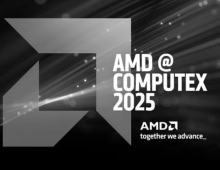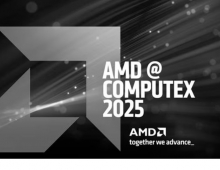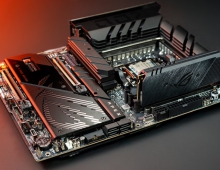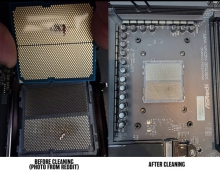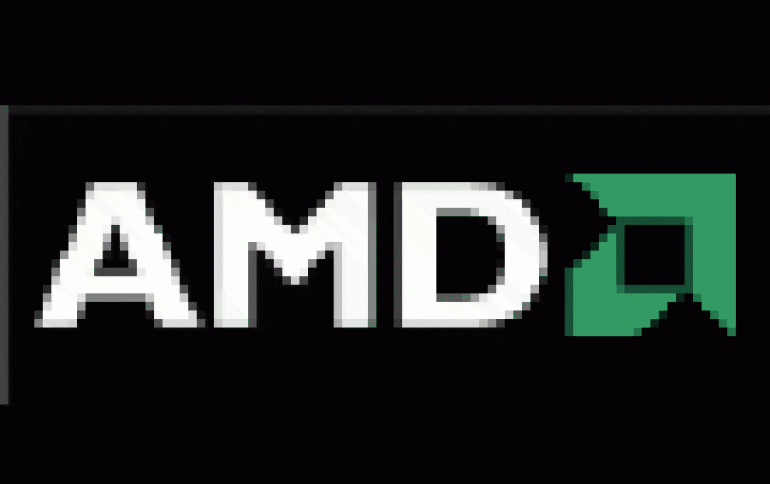
AMD Sees Performance Improvements On AMD FX Processors Systems Running Windows 8
In initial testing of the upcoming Windows 8 operating system, AMD claims that it has seen performance improvements of up to 10% in some applications, when compared to Windows 7.
AMD FX processors use a dual-core module architecture codenamed "Bulldozer", which current versions of Windows 7 were not specifically architected to utilize. In essence, for those with an AMD FX-8150 Processor, for example, Windows 7 sees the eight available cores and randomly assigns threads to them.
According to AMD, Windows 8 correctly recognizes the AMD FX processor architecture and cores. Microsoft recently completed back-porting some of the Windows 8 scheduler code for AMD FX processors into a hotfix for Windows 7.
So if you have an AMD FX processor, here's what you can do to update your version of Windows 7:
- Download the scheduler update (KB2645594) and install. This will tell the scheduler that your AMD FX processor contains dual-core modules. In essence, threads 1-4 now get assigned to their own module first.
- Download the core parking scheduler update (KB2646060) and install. This will prevent Windows 7 shutting down unused cores prematurely when there are threads to be assigned (there?s a performance penalty parking and then un-parking a core).
The best possible cases for improvement are applications that use ½ cores in your AMD FX processor. In AMD's testing using the AMD FX-8150 processor, the company found the best improvement in wPrime, Left 4 Dead 2, and Lost Planet.
However, not every application realizes a performance boost. In fact, heavily threaded apps (those designed to use all 8 cores), get little or no uplift from this hotfix ? they are already maxing out the processor. In other cases, the uplift averages out to a 1-2 percent uplift.
OS Patches Increase Multi-threading performances of Opteron 6200 and 4200 systems
AMD's new AMD Opteron 6200 and 4200 Series processors are also on the road to achieving optimal efficiency in 2012 with the recent release by Microsoft and Red Hat of improved scheduling techniques for their operating systems.
Currently, the CPU scheduling techniques used by Windows Server 2008 R2 SP1 are not optimized for the module architecture of the AMD Opteron 6200 and 4200 Series processors. This means that certain multi-threaded workloads will not be optimally distributed between cores, which can result in decreased system performance.
Microsoft has just posted a hotfix for Windows Server 2008 R2 SP1 documented in KB2645595 that enlightens the OS kernel to the AMD Opteron 6200 and 4200 Series topology so that the kernel can do a better job of scheduling threads to the processor cores. This patch leverages work that AMD and Microsoft have done cooperatively for future versions of the Windows kernel, and can be applied as desired by users running Windows Server 2008 R2 SP1. Below you?ll find links to the patches:
http://support.microsoft.com/kb/2646060
http://support.microsoft.com/kb/2645594
The performance gains that can be expected from this patch depends. Workloads that are moderately threaded have the potential for uplift. This could include virtualization, database, or transactional environments that are "bursty" - a mixture of light and heavy transactions, or legacy applications that are by nature not very threaded. The more heavily threaded the application, the less the likely the uplift. We recommend that interested users apply the patch to a test system and see how their workload responds.
Regarding the Linux world, Red Hat Enterprise Linux (RHEL) 6.2 was released on Dec 6, 2011. RHEL 6.2 is another OS that is "enlightened" for the AMD Opteron 6200 and 4200 Series processors. It delivers higher levels of efficiency realized through resource management and performance optimization and enables enhanced business agility through more flexibility for virtualized and clustered environments.
According to AMD, Windows 8 correctly recognizes the AMD FX processor architecture and cores. Microsoft recently completed back-porting some of the Windows 8 scheduler code for AMD FX processors into a hotfix for Windows 7.
So if you have an AMD FX processor, here's what you can do to update your version of Windows 7:
- Download the scheduler update (KB2645594) and install. This will tell the scheduler that your AMD FX processor contains dual-core modules. In essence, threads 1-4 now get assigned to their own module first.
- Download the core parking scheduler update (KB2646060) and install. This will prevent Windows 7 shutting down unused cores prematurely when there are threads to be assigned (there?s a performance penalty parking and then un-parking a core).
The best possible cases for improvement are applications that use ½ cores in your AMD FX processor. In AMD's testing using the AMD FX-8150 processor, the company found the best improvement in wPrime, Left 4 Dead 2, and Lost Planet.
However, not every application realizes a performance boost. In fact, heavily threaded apps (those designed to use all 8 cores), get little or no uplift from this hotfix ? they are already maxing out the processor. In other cases, the uplift averages out to a 1-2 percent uplift.
OS Patches Increase Multi-threading performances of Opteron 6200 and 4200 systems
AMD's new AMD Opteron 6200 and 4200 Series processors are also on the road to achieving optimal efficiency in 2012 with the recent release by Microsoft and Red Hat of improved scheduling techniques for their operating systems.
Currently, the CPU scheduling techniques used by Windows Server 2008 R2 SP1 are not optimized for the module architecture of the AMD Opteron 6200 and 4200 Series processors. This means that certain multi-threaded workloads will not be optimally distributed between cores, which can result in decreased system performance.
Microsoft has just posted a hotfix for Windows Server 2008 R2 SP1 documented in KB2645595 that enlightens the OS kernel to the AMD Opteron 6200 and 4200 Series topology so that the kernel can do a better job of scheduling threads to the processor cores. This patch leverages work that AMD and Microsoft have done cooperatively for future versions of the Windows kernel, and can be applied as desired by users running Windows Server 2008 R2 SP1. Below you?ll find links to the patches:
http://support.microsoft.com/kb/2646060
http://support.microsoft.com/kb/2645594
The performance gains that can be expected from this patch depends. Workloads that are moderately threaded have the potential for uplift. This could include virtualization, database, or transactional environments that are "bursty" - a mixture of light and heavy transactions, or legacy applications that are by nature not very threaded. The more heavily threaded the application, the less the likely the uplift. We recommend that interested users apply the patch to a test system and see how their workload responds.
Regarding the Linux world, Red Hat Enterprise Linux (RHEL) 6.2 was released on Dec 6, 2011. RHEL 6.2 is another OS that is "enlightened" for the AMD Opteron 6200 and 4200 Series processors. It delivers higher levels of efficiency realized through resource management and performance optimization and enables enhanced business agility through more flexibility for virtualized and clustered environments.





